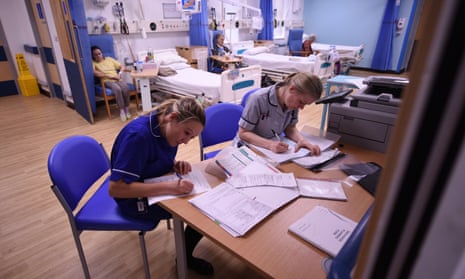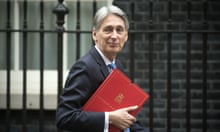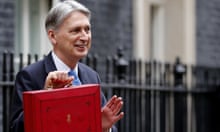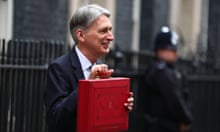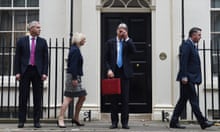Philip Hammond has bowed to intense pressure to give the NHS more money in Wednesday’s budget, but produced less than half the £4bn the health service’s own boss said it needed to look after patients properly next year.
A payment of £1.6bn for the NHS in England in 2018-19 will see its budget rise to £126bn, rather than the £124.4bn originally planned. Similarly, it will receive £900m more than planned in 2019-20 to help it withstand the pressures of coping with the increasing demand for care. However, both are one-off payments, not permanent additions to the NHS’s baseline budget.
The chancellor also promised £337m in emergency funding to boost NHS efforts to avoid its usual winter crisis in the next few months, in a move that underlines how nervous ministers are about a repeat of hospitals visibly struggling to cope during last winter’s “humanitarian crisis”.
He will also provide £3.5bn between now and 2020, as part of a separate injection of £10bn the NHS is due to receive to undertake repairs, build new facilities and modernise patient care. The other £6.5bn will come from selling off surplus NHS land and buildings.
But NHS England, which had warned that any increase short of £4bn next year would cause problems, reacted by claiming that it could no longer deliver all the care, services, waiting times and innovations that are expected of it.
Prof Sir Bruce Keogh, the organisation’s national medical director, tweeted: “Budget plugs some, but def not all, of NHS funding gap. Will force a debate about what the public can and can’t expect from the NHS. Worrying that longer waits seem likely/unavoidable.”
Prof Sir Malcolm Grant, NHS England’s chair, said the extra money “will go some way towards filling the widely accepted funding gap”, which experts expect to hit £21bn by 2022-23. But, he added: “We can no longer avoid the difficult debate about what it is possible to deliver for patients with the money available.”

In a pointed pre-budget intervention on 8 November that irritated Theresa May, the chief executive of NHS England, Simon Stevens, warned that the number of people waiting for surgery would soar and plans to improve cancer and mental healthcare have to be scaled back if it did not get the full £4bn, which three health thinktanks jointly said it needed.
“The level and speed of extra funding announced by the chancellor has exceeded expectations,” said Prof Anita Charlesworth, director of research and economics at the Health Foundation. “The NHS was staring over a precipice – this is an important step away from the edge.”
Nigel Edwards, chief executive of the Nuffield Trust, said the money will “bring respite for patients and NHS staff alike. For now, at least, we have dodged the bullet.”
Prof John Appleby, the trust’s chief economist, disputed the government’s claim – which Hammond repeated in his speech – that it is increasing the NHS’s budget by £10bn during this parliament. “It is still our view that looking at all the relevant budgets, the increase over the Five-Year Forward View period will be around £5bn – not £10bn at all.”
NHS Providers, which represents hospital trusts, said the failure to stump up the whole £4bn meant that “tough choices are now needed” about what the public and politicians can expect of the NHS.
Hammond left NHS staff in the dark about how much they will see their pay go up by next year, despite having lifted the 1% pay cap. And it remains unclear if doctors will get a pay rise, too, or if that will be limited to nurses, midwives and other health personnel.
But NHS bodies and health unions welcomed the fact that, in a significant U-turn, he committed the government to meeting the full cost of whatever the increase turns out to be, once the NHS pay review body makes its recommendations. Previously, he had insisted that the NHS should part-fund the rise through improved productivity.
Labour said that Hammond’s extra spending “won’t fix the deep and severe problems facing the NHS”. Jonathan Ashworth, the shadow health secretary, said: “There was no mention of social care, no news on mental health, and astonishingly, after months of hints from the health secretary, there is still no detail of a pay rise for NHS staff.”
